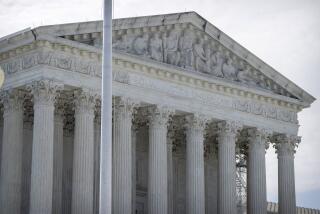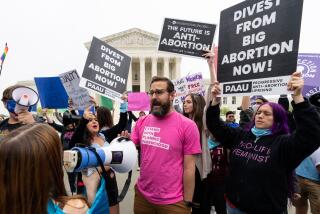Supreme Court vote upholds Texas abortion law

- Share via
WASHINGTON — The Supreme Court cleared the way Tuesday for Texas to enforce a strict new abortion regulation that opponents say prevents a third of the state’s clinics from performing the procedure.
The court, in a 5-4 vote, split along ideological lines in turning down an appeal to block the law that abortion rights advocates challenged as unconstitutional.
The measure, adopted by Texas lawmakers in July, requires that abortion providers have a doctor on their staffs who has admitting privileges at a hospital within 30 miles of the clinic.
By rejecting the request, the justices signaled they do not think the Texas law puts an unconstitutional barrier before women seeking an abortion. The Planned Parenthood Federation said the law had forced 12 of the state’s 36 licensed abortion providers to stop offering abortions.
Justice Stephen G. Breyer said in a dissent that the action “seriously disrupts” the status quo.
“By putting Texas’ new law into immediate effect, it instantly leaves 24 counties in the Rio Grande Valley with no abortion provider,” he said, adding that “it may substantially reduce access to safe abortions elsewhere in Texas.” Breyer cited a brief from Planned Parenthood that estimated that 20,000 women in Texas would be left without service.
Justices Ruth Bader Ginsburg, Sonia Sotomayor and Elena Kagan joined Breyer’s dissent. They said the law should have been put on hold “while the lower courts consider this difficult, sensitive and controversial legal matter.”
Justice Antonin Scalia, in defending the high court’s action, said Breyer and the abortion rights advocates had no basis for “asserting that the [Texas] law is even probably unconstitutional.” He said Planned Parenthood had not “carried the heavy burden” of showing the law was unconstitutional, adding that there was “no special ‘status quo’ standard for laws affecting abortion.” Justices Clarence Thomas and Samuel A. Alito Jr. signed on to Scalia’s statement.
Chief Justice John G. Roberts Jr. and Justice Anthony M. Kennedy did not make any comment but voted to reject the appeal.
“This is good news both for the unborn and for the women of Texas, who are now better protected from shoddy abortion providers operating in dangerous conditions,” Texas Gov. Rick Perry said in a statement issued after the court’s decision. “As always, Texas will continue doing everything we can to protect the culture of life in our state.”
Cecile Richards, president of the Planned Parenthood Federation, said: “While we are deeply disappointed, this isn’t over. We will take every step we can to protect the health of Texas women.” She said the law “demonstrates why we need stronger federal protections for women’s health. Your rights and your ability to make your own medical decisions should not depend on your ZIP Code.”
The Texas law is one of several recent state measures adopted by Republican-controlled legislatures that seek to regulate or restrict abortion without banning it. The laws are drafted in a manner that they are expected to be upheld by the Supreme Court’s conservative-leaning majority that includes Kennedy. In the past, he has voted to uphold abortion regulations, but has refused to strike down Roe vs. Wade and the right to legal abortion.
Texas state lawyers called the “admitting privileges” rule a medical regulation designed to protect the health of women and ensure that clinics had well-qualified doctors on staff who would be there if a patient faced a medical emergency.
But abortion rights advocates said that many hospitals, fearing local criticism, were reluctant to grant admitting privileges to doctors who performed abortions. Moreover, they said hospitals admit patients needing emergency care without regard to whether the patient’s doctor has admitting privileges, making the law irrelevant.
A federal judge had initially blocked the admitting-privilege rule from taking effect and said there was no “rational basis” to believe it would improve healthcare for abortion patients.
Texas Atty. Gen. Greg Abbott quickly appealed and won a reversal from the U.S. 5th Circuit Court of Appeals in New Orleans. In a 3-0 decision, its judges said the law was valid and reasonable, and could take effect.
The judges agreed with Texas state lawyers, who argued that pregnant women in the Rio Grande Valley could drive to abortion clinics about 100 miles away. “An increase in travel distance of less than 150 miles for some women is not an undue burden on abortion rights,” Judge Priscilla Owen wrote for the 5th Circuit.
The Planned Parenthood Federation filed its emergency appeal with the Supreme Court on Nov. 4. Its attorney said the law would “render the constitutional right to abortion illusory for nearly 1 in 3 Texas women who would exercise that right.”
Times staff writer Molly Hennessy-Fiske contributed to this report from Houston.
More to Read
Sign up for Essential California
The most important California stories and recommendations in your inbox every morning.
You may occasionally receive promotional content from the Los Angeles Times.











